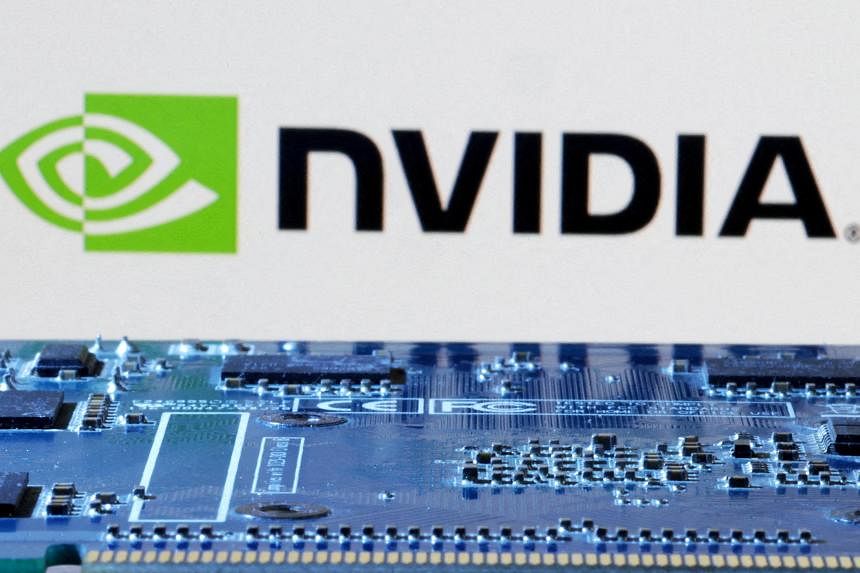BEIJING/SINGAPORE – Chinese universities and research institutes recently obtained high-end Nvidia artificial intelligence (AI) chips through resellers, despite the US widening a ban in 2023 on the sale of such technology to China.
A Reuters review of hundreds of tender documents shows that 10 Chinese entities acquired advanced Nvidia chips embedded in server products made by Super Micro Computer, Dell Technologies and Taiwan’s Gigabyte Technology, after the United States in November 2023 expanded the embargo to subject more chips and countries to licensing rules.
Specifically, the servers contained some of Nvidia’s most advanced chips, according to the previously unreported tenders fulfilled between Nov 20 and Feb 28. While the US bars Nvidia and its partners from selling advanced chips to China, including via third parties, the sale and purchase of the chips are not illegal in China.
The 11 sellers of the chips were little-known Chinese retailers. Reuters could not determine whether, in fulfilling the orders, they used stockpiles acquired before the US tightened chip export restrictions in November.
Contacted by Reuters, Nvidia said the tenders specify products that were exported and widely available before the restrictions. “They do not indicate that any of our partners violated the export control rules and are a negligible fraction of the products sold worldwide,” an Nvidia spokesperson said.
The server makers said they comply with applicable laws or will investigate further.
Among the buyers were the Chinese Academy of Sciences, Shandong Artificial Intelligence Institute, Hubei Earthquake Administration, the Shandong and Southwest universities, a tech investment firm owned by the Heilongjiang provincial government, a state-run aviation research centre, and a space science centre.
None of the Chinese buyers and retail sellers responded to questions from Reuters about the matter.
Mr Daniel Gerkin, a partner at law firm Kirkland & Ellis, said Nvidia chips could have been diverted to China without a manufacturer’s knowledge, given the lack of visibility into downstream supply chains. If the manufacturer had performed sufficient due diligence, “it presumably would be challenging for the US government to pursue an enforcement action”, he added.
The US Commerce Department told Reuters it cannot comment on any potential ongoing investigations, but said its Bureau of Industry and Security monitors diversions of restricted chips, conducts end-use checks and examines potential breaches.
Officials will investigate credible allegations of violations, including through the use of shell companies, a spokesperson said.
Nvidia said systems built with its graphic processing units (GPUs) – chips that break computer tasks into smaller pieces and process them together – and resold by third parties must comply with US restrictions.
“If we determine that any product was subsequently resold in violation of US export control rules, we’ll work with our customers to take appropriate action,” the Nvidia spokesperson said.
Super Micro said it complies with US requirements on the sale and export of GPU systems to regions and parties that require licences.
“If we become aware that a third party has exported or re-exported without the required licences, we investigate the matter and take appropriate action,” it said.
In a letter to Reuters on behalf of Super Micro, US law firm Clare Locke said its client “goes above and beyond what US export restrictions require” by proactively taking steps to ensure its customers do not violate the curbs.
In relation to the tenders that identified its products, Super Micro said they represent “older-generation or general purpose servers not capable of the largest-scale AI operations that were available in China prior to the export control regulations”.
The awarded suppliers “are not known Super Micro customers”, the company said.
A Dell spokesperson said the company has found no evidence of shipping products configured with the restricted chips listed to the entities named, but that it will continue to investigate.
Gigabyte said in an e-mail that it complies with Taiwanese laws and international regulations. It did not respond to subsequent questions about tenders that identified its products as a source of banned Nvidia chips. Taiwan’s Economy Ministry said it expects Taiwanese companies to respect US export controls.
Research benefits
The transactions were disclosed in a dozen of the tenders, which Reuters found on public databases that cover only a fraction of purchases by China’s state entities. But the small snapshot shows China still has access to advanced chips that US officials say could support AI for military applications, such as the modernisation of China’s defence forces or for developing weapons like hypersonic missiles.
Each of the purchases was limited to several servers and several dozen banned chips. Still, they could be useful for training models and conducting advanced research, according to seven analysts and industry executives.
Reuters only analysed tenders whose winners had been announced.
Companies and people accused of violating US export controls can face civil or criminal penalties in the US, including fines of hundreds of thousands of dollars and up to 20 years’ jail for individuals.
Reuters in 2023 reported that an underground trade in Nvidia chips had emerged in China, as evident at Shenzhen’s Huaqiangbei electronics market in June, before the US widened its curbs. On a return visit in December, the vendors who had spoken to Reuters months earlier had gone, and other sellers said they did not know why they left.
Reuters could not establish why the vendors were no longer at the market. REUTERS

